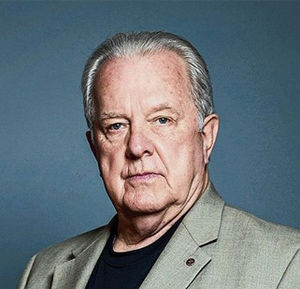Kirk Wiebe
( spook, whistleblower) | |
|---|---|
 | |
| Nationality | US |
| Member of | Veteran Intelligence Professionals for Sanity |
NSA whistleblower on waste and warrantless searches. | |
J. Kirk Wiebe is an NSA whistleblower who worked for the agency for more than 32 years before retiring in October 2001.[1][2]
NSA Whistleblower
Kirk Wiebe worked with Bill Binney and Ed Loomis in the NSA’s SIGINT Automation Center (SARC) as a senior intelligence analyst, on a program called ThinThread. ThinThread was a computer program that sifted through internet communications, as part of NSA's drive to "own the net.”[3] Thinthread nominally separated Americans from the rest of the world, because the NSA is authorized to look at anything foreign, but, at least formally, not American citizens without a warrant.
NSA employees J. Kirk Wiebe, William Binney, Ed Loomis, and House Permanent Select Committee on Intelligence staffer Diane Roark complained to the Department of Defense's Inspector General (IG) about waste, fraud, and abuse in the program, and the fact that a successful operating prototype of an efficient sorting program, called Thinthread, existed. The complaint was accepted by the IG and an investigation began that lasted until mid-2005 when the final results were issued. The results were largely hidden, as the report given to the public was heavily (90%) redacted, while the original report was heavily classified, thus restricting the ability of most people to see it.
On 31 October 2001, Wiebe, Binney, and colleague Ed Loomis retired from NSA in disgust, hoping to bring their innovative approach to analyzing “big data” while protecting privacy to government through another door.
The people who filed the IG complaint were later raided by armed Federal Bureau of Investigation (FBI) agents. While the Government threatened to prosecute all who signed the IG report, it ultimately chose to pursue an NSA Senior Executive Thomas Andrews Drake who helped with the report internally to NSA and who had spoken with a reporter about the project. Drake was later charged under the Espionage Act of 1917. His defenders claimed this was retaliation. The charges against him were later dropped, and he agreed to plead guilty to having committed a misdemeanor under the Computer Fraud and Abuse Act. Wiebe was not charged by the FBI.
He received the NSA’s second-highest award, the Meritorious Civilian Service Award, the director of CIA’s Meritorious Unit Award, and a Letter of Commendation from the secretary of the Air Force.[4]
References
- ↑ http://therealnews.com/t2/index.php?option=com_content&task=view&id=31&Itemid=74&jumival=11931
- ↑ https://www.pbs.org/wgbh/pages/frontline/government-elections-politics/united-states-of-secrets/the-frontline-interview-j-kirk-wiebe/
- ↑ https://www.opendemocracy.net/en/we-could-have-stopped-paris-attacks/
- ↑ https://www.democracynow.org/2013/12/19/nsa_whistleblower_kirk_wiebe_details_govt